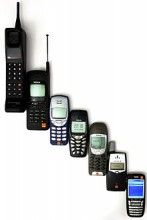Smartphone kill-switch mandate takes effect
by Josephine Djuhana | July 2, 2015 5:00 am
 [1]On Wednesday, legislation requiring kill-switch technology for all smartphones sold in California took effect. Senate Bill 962 requires companies to embed specific kill switches in smartphones at the point of sale; the bill was passed by the Legislature and approved by Gov. Jerry Brown in August of last year.
[1]On Wednesday, legislation requiring kill-switch technology for all smartphones sold in California took effect. Senate Bill 962 requires companies to embed specific kill switches in smartphones at the point of sale; the bill was passed by the Legislature and approved by Gov. Jerry Brown in August of last year.
Bill author Sen. Mark Leno, D-San Francisco, crafted this legislation due to a surge in smartphone theft in recent years, where such thefts account for one-third of all robberies in the county. According to data reported[2] by San Francisco District Attorney George Gascón, “smartphone theft accounted for 60 percent of all robberies in San Francisco and up to 75 percent of all robberies in Oakland.” Los Angeles also “experienced a 26 percent increase in smartphone thefts since 2011.”
Gascón blamed the wireless industry for failing “to safeguard its products,” resulting in victimized consumers.
Both Gascón and Sen. Leno contended that the industry’s previously voluntary measures placed “too great a burden on individual consumers to take action,” whereas mandated adoption of anti-theft solutions could “undercut the black market” since potential thieves would know that most stolen phones could be “bricked” and thus “far less valuable.”
SB962 was opposed by the business community, particularly the high-tech industry. The San Jose Silicon Valley Chamber of Commerce wrote in opposition that “private sector solutions should be sought whenever possible to address public concerns.” SB962, they said, has a well-intentioned goal to decrease theft and increase privacy, but “would not achieve that ultimate outcome.” The chamber also pointed to the fact that most smartphone operating systems developed in Silicon Valley, including Apple’s iOS and Microsoft’s Windows Phone, “already possess the capability to remotely lock, erase or disable … mobile devices.”
The Wireless Association, joined by smartphone manufacturers such as Motorola, Nokia and Huawei, as well as major carriers like AT&T, Sprint, T-Mobile and Verizon, also wrote[3] a letter in opposition warning of “negative consequences to consumer security and public safety.” According to the letter, the risks posed by SB962 included:
- Impractical state laws: “State regulation will never keep pace with innovation in the wireless ecosystem. What state lawmakers mandate as a solution today may not be the solution consumers demand or need tomorrow.”
- Limiting consumer choice: “Any mandated technology standard will quickly become outdated in the fast-moving wireless application world. Requiring a particular technology is also counter to the policies that have made the wireless industry one of the most important and vibrant sectors of our economy.”
- Hacking drawbacks: “If consumers can turn mobile devices into ‘bricks,’ so can hackers. As the L.A. Times has suggested, any technology that is mandated widely across the nation may be at a greater risk of security breaches and attacks.”
The association also addressed specific steps the wireless industry has taken in working with the FCC and law enforcement to actively address the issue.
Sen. Leno said in a prepared statement that smartphone theft is “already on the decline as more new phones come equipped with kill switches.” The release highlighted[4] a Consumer Reports study from June showing that, in 2014, 2.1 million Americans had their phones stolen, down from 3.1 million in 2013. This 30 percent decrease could be attributed to the passage of SB962, but also the natural progression of technology and the industry’s cooperation with the FCC to protect consumers.
Since the passage of the bill, smartphone manufacturers indicated most phones sold in the U.S. would meet the California standard for kill switches, rather than creating a California-specific phone.
- [Image]: http://calwatchdog.com/wp-content/uploads/2015/03/Cell-Phone.jpg
- reported: http://leginfo.legislature.ca.gov/faces/billAnalysisClient.xhtml?bill_id=201320140SB962
- wrote: http://www.ctia.org/docs/default-source/Legislative-Activity/coalition-letter-of-concern-in-response-to-california-senate-bill-962-regarding-smartphone-theft.pdf?sfvrsn=0
- highlighted: http://www.consumerreports.org/cro/news/2015/06/smartphone-thefts-on-the-decline/index.htm
Source URL: https://calwatchdog.com/2015/07/02/smartphone-kill-switch-mandate-takes-effect/